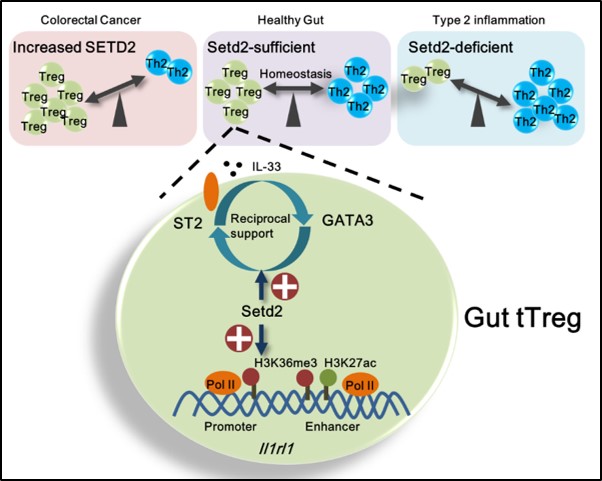Researchers Reveal Role of Setd2 in Treg Cells and Intestinal Immunity
A recent study by Dr. QIU Ju’s group from Shanghai Institute of Nutrition and Health (SINH), Chinese Academy of Sciences (CAS) and collaborators found that Setd2 could maintain the homeostasis of intestinal Treg and facilitate GATA3 and ST2 expression in intestinal tTreg cells, thereby inhibiting intestinal inflammatory. Entitled “Setd2 supports GATA3+ST2+thymic-derived Treg cells and suppresses intestinal inflammation”, this research was published online in Nature communications on December 3rd, 2022.
Setd2 (set-domain-containing 2) is a lysine (H3K36) methyltransferase that mediate H3K36me3 in mammalian cells. Setd2 also plays an important role in cell development, tumor and inflammation. Regulatory T (Treg) cells, a group of immunosuppressive cells, are further categorized into two subgroups according to their developmental origin: thymic-derived Treg (tTreg) cells that acquired Foxp3 expression in the thymus during development; peripherally induced Treg (pTreg) cells that are induced to express Foxp3 in the periphery. Treg cells affect the progression of colitis and colon cancer through a variety of mechanisms, and its differentiation and function are regulated by epigenetic modifications. So far, the effect of SETD2-mediated H3K36me3 modification on Treg cells have remained elusive.
In this study, researchers found that Setd2 is essential for Treg cells to repress T cell activation, and Setd2-deficient Treg cells possess reduced capability to inhibit T cell activation in the secondary lymphoid organs (SLOs) and the intestine. Setd2 maintains Treg homeostasis by sustaining Treg survival. Setd2 supports Treg cells to inhibit CD45RBhighT cell-induced colitis and TNBS-induced colitis. In the intestine, the percentage of Helios+ Treg cells among total Treg cells was decreased and the percentage of RORγt+ Treg cells was increased in Foxp3Cre-YFPSetd2?f/f mice. However, the number of RORγt+ Treg cells was unchanged which indicates that pTreg cells are less dependent on Setd2.
With analysis of intestinal Treg ontogeny, and using tools including Il33 knockout mice and GATA3/ST2 overexpression, researchers proved that Setd2 supports the induction, as well as the reciprocal relationship, of GATA3 and ST2 in intestinal tTregs. IL-33 preferentially boosts Th2 cells rather than GATA3+ Treg cells in Foxp3Cre-YFPSetd2?flox/flox mice, corroborating the constraint of Th2 responses by Setd2 expression in Treg cells.
Mechanistically, by analyzing CUT&Tag of H3K27ac and Pol II, researchers revealed that Setd2 regulates the transcription of target genes (including Il1rl1) by modulating the activity of promoters and intragenic enhancers where H3K36me3 is typically deposited. This work established a mechanistic link between epigenetic modification of immune cells and development of colitis and colon cancer.
The study was sponsored by the Ministry of Science and Technology of China, the National Natural Science Foundation of China, and the Science and Technology Commission of Shanghai Municipality. Dr. QIU Ju from SINH, Dr. SHENG Huiming from Tongren Hospital, Shanghai Jiao Tong University School of Medicine and Dr. LI Li from Shanghai Jiao Tong University are the corresponding authors of this article. Dr. DING Zhaoyun and Dr. CAI Ting from SINH are the first author. It was also supported and helped by Dr. ZHOU Hong from School of Life Science, Anhui Medical University, Dr. QIN Jun from SINH, Dr. LIU Mofang from Center for Excellence in Molecular Cell Science of CAS, and Dr. WANG Gang from School of Life Sciences Fudan University. YE Yanwen and WEI Huanhuan from Dr. WANG Zefeng’s group of SINH provided technical supports.

Regulation of Treg cells by Setd2 suppresses intestinal inflammation. (Image provided by Dr. QIU Ju’s group)
Media Contact:
WANG Jin
Shanghai Institute of Nutrition and Health,
Chinese Academy of Sciences
Email: wangjin01@sinh.ac.cn
Web: http://english.sinh.cas.cn/
